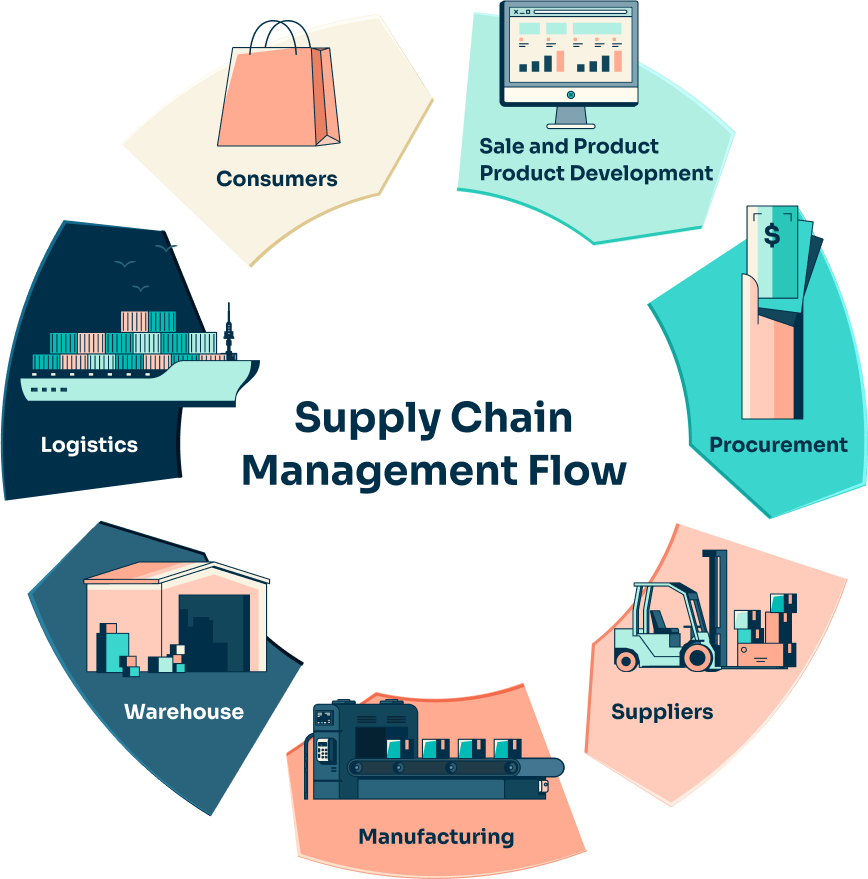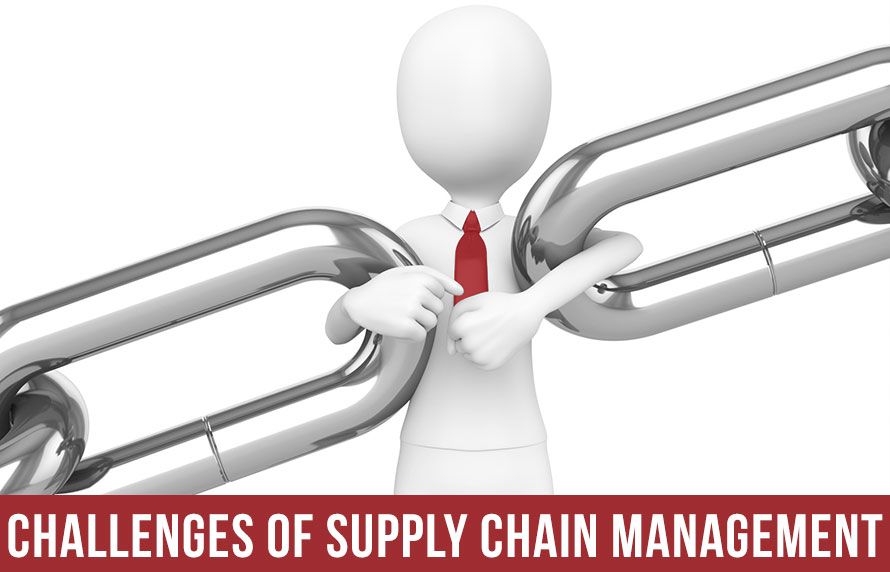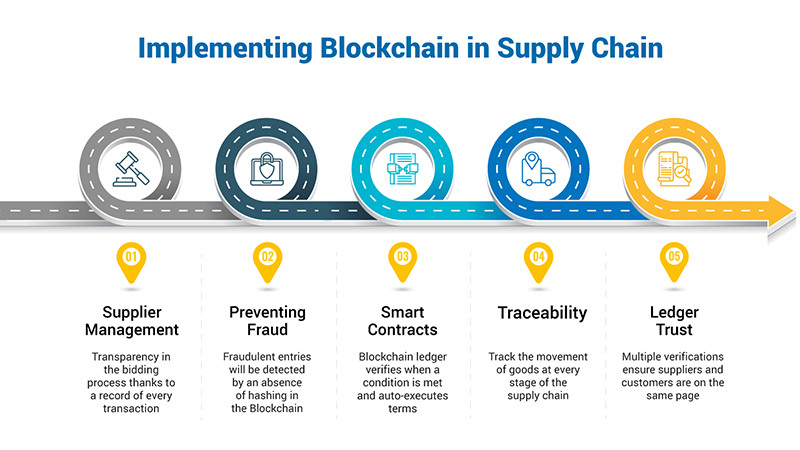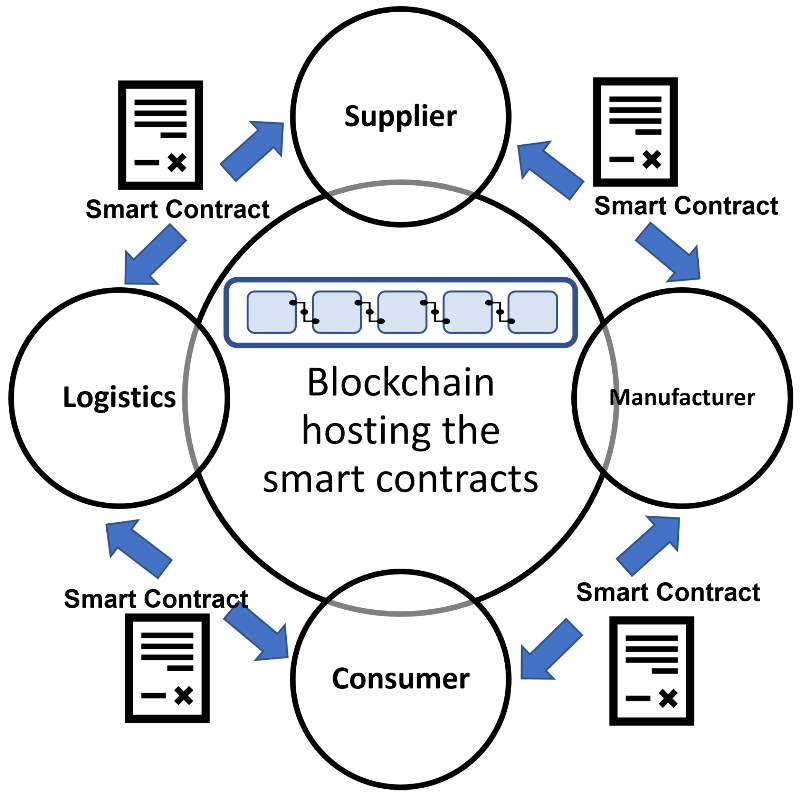Contents
- What is Supply Chain Management?
- Challenges faced by Supply Chain Management Industry
- Role of Blockchain in Supply Chain Management
- Here's how Blockchain revolutionizes Supply Chain Management Industry
- Transparency and Traceability
- Authentication and Anti-Counterfeiting
- Real-time Tracking
- Reduced Fraud
- Smart Contracts
- Supplier Verification
- Efficiency and Cost Reduction
- Supply Chain Financing
- Dispute Resolution
- Sustainability and Compliance
- Collaboration
- Conclusion
What is Supply Chain Management?
Supply chain management (SCM) is the coordinated management of various processes, activities, and resources involved in the production, procurement, distribution, and delivery of goods and services to customers. It encompasses the entire lifecycle of products, from raw material sourcing to manufacturing, distribution, and ultimately reaching the end consumer.

The goal of supply chain management is to optimize the efficiency, cost-effectiveness, and responsiveness of these processes, ensuring that products are delivered in the right quantity, quality, and at the right time to meet customer demands. Effective supply chain management involves strategic planning, coordination, and collaboration among suppliers, manufacturers, distributors, and retailers to ensure a seamless flow of materials, information, and resources.
Challenges faced by Supply Chain Management Industry
Supply chain management has become increasingly complex in today’s global business environment. With the rise of e-commerce and the increasing demands of consumers, supply chain managers face numerous challenges that can impact their business operations. From managing inventory levels to navigating international regulations, the challenges of supply chain management are diverse and ever-evolving.

Listed below are a few of the challenges faced by supply chain management industry
- Lack of Transparency
- Complex Global Networks
- Demand Volatility
- Supplier Reliability Issues
- Inventory Inefficiencies
- Risk of Counterfeiting
- Data Security Vulnerabilities
- Stringent Regulatory Compliance
- Environmental Sustainability Pressures
- Escalating Operational Costs
- Transportation Challenges
These challenges disrupt operational efficiency, hinder effective decision-making, threaten customer satisfaction, and overall supply chain resilience.
Overcoming these hurdles requires innovative solutions such as blockchain, IoT integration, advanced analytics, and collaborative partnerships to enhance transparency, streamline operations, and ensure resilience in the face of dynamic market conditions.
Role of Blockchain in Supply Chain Management
Blockchain plays a transformative role in supply chain management by enhancing transparency, traceability, and trust among participants. It establishes an immutable, decentralized ledger that records every transaction and movement of goods throughout the supply chain. This enables real-time tracking, authentication, and verification of products, reducing counterfeiting risks and ensuring the authenticity of goods. Blockchain's smart contracts automate processes like payments and compliance, enhancing efficiency and reducing administrative overhead. By enabling secure and transparent data sharing among stakeholders, blockchain streamlines supply chain operations, minimizes disputes, and ultimately leads to improved visibility, accountability, and collaboration within complex supply chain networks.

Here's how Blockchain revolutionizes Supply Chain Management Industry
Transparency and Traceability
Blockchain revolutionizes supply chains by introducing unprecedented transparency and traceability. Utilizing an immutable ledger, each supply chain stage is meticulously logged in a tamper-proof, shared database accessible to authorized parties. This furnishes instantaneous insight into product movement, origin, and ensuring the authenticity of goods. Items can be assigned exclusive digital identifiers, affirming authenticity and curtailing counterfeiting risks. Blockchain's capability to identify and thwart unauthorized modifications guarantees data integrity, and its decentralized structure fosters collaboration, confidence, and rapid conflict resolution within stakeholders. Supply Trace by Chainize provides an easy to deploy solution.

Authentication and Anti-Counterfeiting
Blockchain enhances supply chain authentication and combats counterfeiting by assigning unique tokens to products. These tokens enable rapid verification of product authenticity and origin. As products move through the supply chain, their journey is recorded in an immutable ledger, ensuring a transparent and tamper-proof history. This robust system significantly reduces the risk of counterfeit products infiltrating the market, bolstering consumer confidence and brand credibility.
Real-time Tracking
Through an unalterable ledger, blockchain facilitates instantaneous monitoring within supply chains by documenting each product's motion. As products traverse the supply chain, their location and status are instantly updated and stored on the blockchain. This provides stakeholders with accurate and up-to-date information on product whereabouts, enabling proactive decision-making, optimized logistics, and reduced delays. Real-time tracking enhances transparency and responsiveness, contributing to more efficient and reliable supply chain operations.

Reduced Fraud
Blockchain mitigates fraud in supply chains through the introduction of a tamper-resistant and decentralized ledger system. All transactions and movements are meticulously documented, rendering unauthorized changes virtually implausible. This transparent and consensus-driven methodology obviates the necessity for intermediaries, subsequently diminishing chances for deceitful practices. Moreover, the collaborative and verifiable essence of blockchain data thwarts fraudulent assertions and illicit alterations, effectively upholding the trustworthiness of supply chain functions and transactions.
Smart Contracts
In supply chain management, blockchain-enabled smart contracts automate and autonomously execute pre-established business rules and procedures. These contracts initiate responses, like notifications or payments, upon the fulfillment of certain criteria. By eliminating the necessity for intermediaries and manual interference, smart contracts streamline procedures, curtail processing durations, and heighten precision, ultimately resulting in elevated efficiency and enhanced cooperation among participants in the supply chain.

Supplier Verification
Blockchain streamlines supplier verification in supply chain management by securely storing verified supplier information on an immutable ledger. This enables easy sharing of certifications and compliance data among participants, ensuring transparency and trust. With blockchain's indelible records, stakeholders can promptly validate the legitimacy of suppliers, reducing the risk of working with unauthorized or non-compliant entities.
Efficiency and Cost Reduction
Blockchain enhances supply chain efficiency and cuts down expenses by eliminating intermediaries, automating procedures, and enhancing data precision. The transparent and collaborative ledger streamlines record-keeping, diminishing administrative tasks and potential errors. Smart contracts automate diverse supply chain operations, such as payments and compliance verification, resulting in quicker transactions, reduced paperwork, and overall reductions in operational expenses.
Supply Chain Financing
Blockchain revolutionizes supply chain financing by offering transparent and real-time visibility into transactions and assets. Financial organizations can confidently evaluate lending risks using authenticated blockchain data, facilitating swifter and well-informed lending choices. This streamlined process benefits suppliers by granting them faster access to funds at favorable rates, ultimately enhancing cash flow and strengthening relationships within the supply chain ecosystem.
Dispute Resolution
Blockchain streamlines dispute resolution in supply chain management by creating an immutable record of transactions and activities. This transparent and tamper-proof ledger ensures accurate and reliable data for all parties. In case of disputes, stakeholders can quickly trace back through the blockchain to identify the origin of the issue, facilitating efficient and informed conflict resolution. This accelerates decision-making, reduces costs, and strengthens collaboration among supply chain participants.
Sustainability and Compliance
Blockchain improves sustainability and regulatory adherence in supply chain management by establishing an immutable ledger detailing product origins, sourcing, and manufacturing procedures. This guarantees transparency in upholding ethical and environmental criteria. Through blockchain's transparent and tamper-resistant data, stakeholders can authenticate assertions regarding sustainability and regulatory conformity, fostering enhanced accountability and trust among involved parties.

Collaboration
Blockchain enhances collaboration in supply chain management by providing a secure and shared platform for real-time data exchange among all stakeholders. Through a decentralized and transparent ledger, participants can access accurate and consistent information, reducing misunderstandings and enhancing trust. This fosters better communication, coordination, and decision-making across the supply chain network, leading to improved efficiency, reduced delays, and enhanced overall collaboration.
Conclusion
In essence, blockchain's ability to establish trust, ensure transparency, automate processes, and enable secure data sharing makes it a revolutionary technology for supply chain management. It addresses pain points such as lack of transparency, fraud, inefficiencies, and lack of accountability, thereby reshaping how products are sourced, manufactured, and delivered in today's complex global supply chains. For more information and other Enterprise use cases, contact Chainize.


